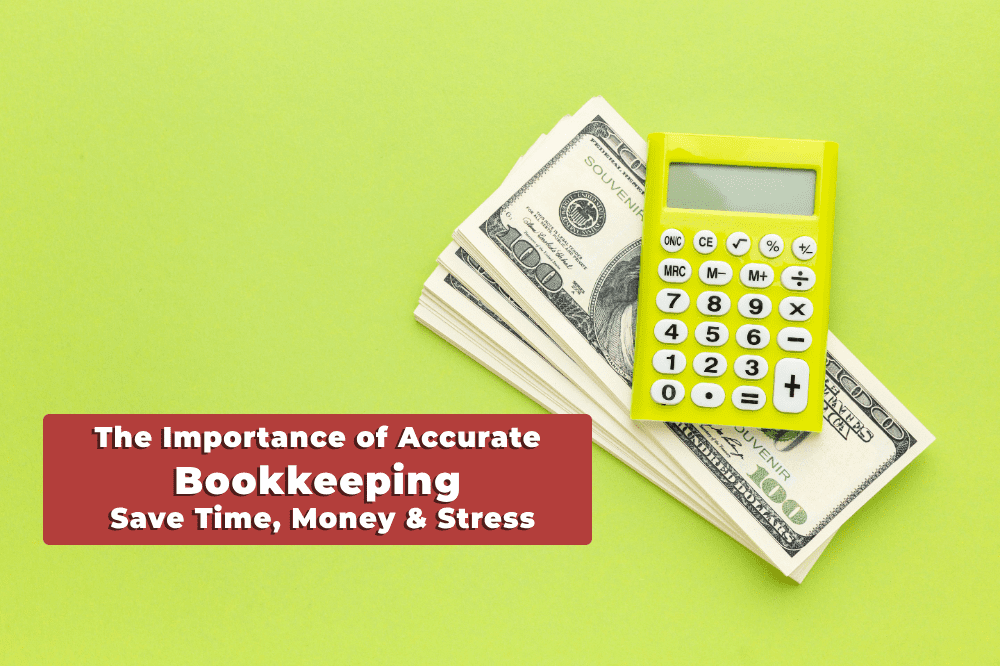Running a business is exciting, but keeping track of finances can be challenging. Yet, good bookkeeping is essential for the success of any business, big or small. In this blog, we’ll explore The Importance of Accurate Bookkeeping and how it can save you time, money, and stress, especially when tax season rolls around. By the end, you’ll understand why maintaining clear and organized financial records is critical for your business’s success.
What Is Bookkeeping?
Bookkeeping is the process of recording and organizing your business’s financial transactions. These transactions include your income, expenses, payroll, and taxes. Think of bookkeeping as the foundation of your business’s financial health. Without it, you risk losing track of important details that could affect your profits, growth, and even legal compliance.
Why Is Accurate Bookkeeping Important?
1. Better Financial Management
Accurate bookkeeping gives you a clear picture of your financial health. When you know how much money is coming in and going out, you can make smarter business decisions. For example, you’ll know when to invest in new equipment or whether you can afford to hire more employees.
2. Tax Compliance Made Easy
Tax season can be stressful, but it doesn’t have to be if your books are in order. With accurate bookkeeping, you’ll have all the information you need to file your taxes correctly and on time. This minimizes the risk of audits, penalties, or missed deductions.
How Accurate Bookkeeping Saves You Time
When your records are well-organized:
You don’t have to scramble at the last minute to find receipts or invoices.
Financial reports and tax forms can be prepared quickly and efficiently.
You spend less time explaining your finances to your accountant, saving both parties valuable hours.
For example, if you’re a small business owner using software like QuickBooks or Xero, you can automatically sync your transactions and generate reports in minutes. This automation reduces manual effort and makes staying on top of your finances easier than ever.
How It Saves You Money
1. Avoiding Costly Errors
Mistakes in your financial records can lead to overpaid taxes, missed deductions, or even fines from the IRS. Accurate bookkeeping ensures that your numbers are correct, helping you avoid these costly errors.
2. Maximizing Tax Deductions
Did you know that many business expenses can be written off to lower your taxable income? From office supplies to travel expenses, accurate bookkeeping helps you track these costs, so you don’t miss any potential savings.
Pro Tip: Keep a digital or physical record of all receipts and invoices. This will make it easier to claim deductions later.
For more information, check out the IRS’s guide on deductible business expenses.
How It Reduces Stress
Tax time can feel overwhelming, but having accurate and up-to-date books removes much of the anxiety. Here’s how:
- You know where every dollar came from and where it went.
- You’re prepared to answer any questions from the IRS or your accountant.
- You can plan ahead by estimating your tax bill well in advance.
Accurate bookkeeping also gives you peace of mind, knowing your business complies with all tax laws and financial regulations.
You may also like to read:
10 Bookkeeping Tips Every New Business Owner Should Know to Stay Organized
Starting a new business is exciting, but it comes with responsibilities—including keeping your finances in order. Good…
Read More

Tips for Keeping Accurate Records
- Use Bookkeeping Software: Manual bookkeeping can work for very small businesses, but software solutions offer better accuracy and efficiency. Tools like QuickBooks, FreshBooks, or Wave can automate many tasks, such as categorizing expenses and generating financial reports.
- Reconcile Your Accounts Monthly: Reconciliation means matching your financial records with your bank statements to ensure everything adds up. Doing this monthly can help you catch and correct errors early.
- Keep Personal and Business Finances Separate: Always use separate bank accounts and credit cards for your business. Mixing personal and business finances can make bookkeeping messy and even cause legal complications.
- Hire a Professional Bookkeeper: If bookkeeping feels overwhelming, consider hiring a professional. A trained bookkeeper or accountant can ensure your records are accurate and up-to-date, saving you time and stress.
Common Bookkeeping Mistakes to Avoid
- Not Keeping Receipts: Always save proof of expenses, as the IRS may ask for documentation.
- Ignoring Small Transactions: Even small expenses can add up, so record every transaction.
- Procrastinating: Don’t wait until the end of the year to update your books. Regular updates make bookkeeping less daunting.
- Skipping Professional Advice: Consulting a tax professional ensures you’re not missing opportunities to save money. You can refer to the IRS’s recordkeeping guidelines for detailed information on maintaining proper documentation.




